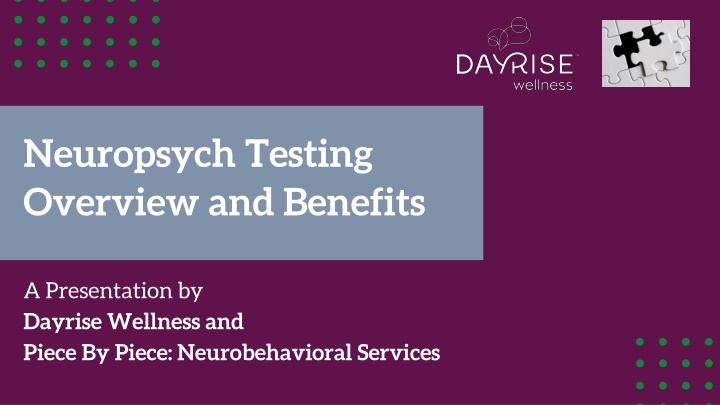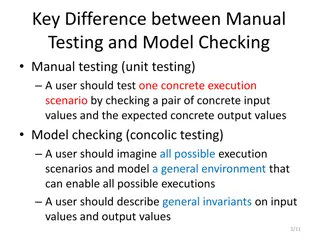
Neuropsych Testing Overview and Benefits
Discover the importance of neuropsychological evaluations for assessing cognitive function and behavior. Learn how testing can benefit therapists, teachers, parents, and students in understanding and treating various cognitive challenges. Explore the cognitive domains tested, social and emotional functioning assessments, and indicators signaling the need for neuropsychological evaluation.
Download Presentation

Please find below an Image/Link to download the presentation.
The content on the website is provided AS IS for your information and personal use only. It may not be sold, licensed, or shared on other websites without obtaining consent from the author. If you encounter any issues during the download, it is possible that the publisher has removed the file from their server.
You are allowed to download the files provided on this website for personal or commercial use, subject to the condition that they are used lawfully. All files are the property of their respective owners.
The content on the website is provided AS IS for your information and personal use only. It may not be sold, licensed, or shared on other websites without obtaining consent from the author.
E N D
Presentation Transcript
Neuropsych Testing Overview and Benefits A Presentation by Dayrise Wellness and Piece By Piece: Neurobehavioral Services
Neuropsychological Evaluations Can Help: Therapists Teachers Parents/Guardians Providers Students Learn how to best understand, teach, treat and interact with your child. Results are beneficial in school and therapeutic settings.
How Are The Brain Functions Tested? Neuropsychology assesses brain functioning through a series of brain teaser-like tests that examine different areas of thinking, such as: Attention Memory Language Emotional Functioning Social Functioning
Cognitive Domains General Intellectual Functioning Academic Achievement Full Scale IQ Skills and Fluency Verbal Comprehension Index Perceptual Reasoning Index Working Memory Index Processing Speed Index Discrepancies between indices Reading Phonological processing and awareness Comprehension Fluency (oral reading and silent reading) Phonemes to Graphemes Writing Mathematics
Social Functioning Emotional Functioning The ability to understand social Externalizing behaviors Conduct problems Aggressiveness interactions, engage in imaginary play, understand nonverbal Internalizing behaviors communication, and to make abstract, Depression Anxiety Somatization vs. literal, interpretations. Adaptive skills Interpersonal relationships
What Would Warrant Referral for Neuropsych Testing?
Academic Problems Attention Difficulties Emotional Concerns Irritable Emotional outbursts Aggression Sadness Poor sleeping and eating habits Poor grades Negative teacher reports Difficulty grasping concepts Poor attention to detail Disorganization Impulsive behaviors
Behavioral Concerns Social Issues Difficulty making or maintaining friends Does not understand social rules Victim or perpetrator in bullying School refusal Tantrums Defiance Violence or aggression Dangerous behaviors
Comprehensive Report Background Reported symptoms Medical and social histories Results Summary Diagnoses Recommendations tailored to the patient's individual needs
Benefits of Neuropsychological Evaluation in Therapy Given that everyone is unique, not every therapeutic approach helps everyone. Neuropsychological evaluations can help create a road map of treatment modalities and approaches that are the most beneficial to your child. Results will highlight strengths and areas of improvement to help the clinician focus on those concerns. Results can help you navigate your child s treatment
Benefits of Neuropsychological Evaluation in Schools Identify learning disorders Identify sources of stress in school Help identify supports to increase academic functioning Teachers better understand your child s strengths and weaknesses Can help determine if an IEP is needed
PIECE BY PIECE: NEUROBEHAVIORAL SERVICES DAYRISE WELLNESS (331) 425-8625 (630) 280-8173 care@daryrisewellness.com info@PieceByPieceNS.com dayrisewellness.com piecebypieceneurobehavioralservices.com 500 Waters Edge Suite 100 2021 Midwest Rd Suite 104 Lombard, IL 60148 Oak Brook, IL 60523






















